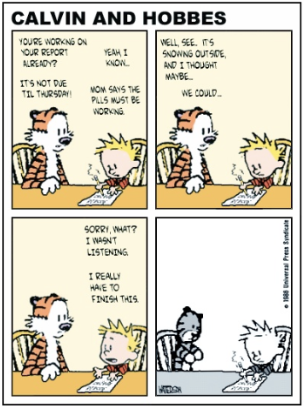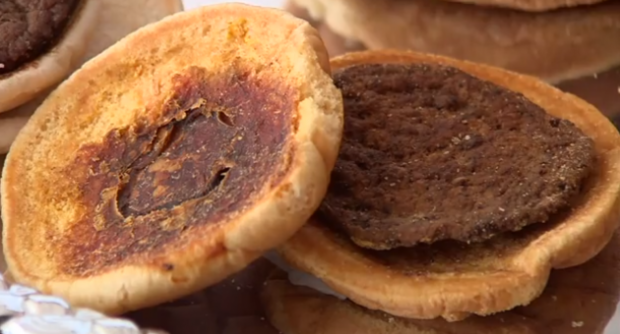Sciencey types often criticise Christians for choosing faith over science/reason (although there is actually no need for such a messy divorce), and yet this is not a Christian problem; it is a human problem. Christian faith isn’t actually the same thing as belief-without-foundation, but many believers treat it as such, yet this seems also to be the way in which most people relate to the world around them. Knowing something takes work; laziness and presumption are easy substitutes.
Amazing feats of presumption are everywhere. Take these three examples that I’ve come across in recent weeks.
1. ‘Calvin & Hobbes’ hates Ritalin
Pinterest tells me that this cartoon is the saddest thing some or other user has ever seen, and not because it’s a fake Calvin & Hobbes cartoon.
The idea is that Calvin’s parents finally succumbed and started giving him ‘pills’, presumably Ritalin, and as a result he no longer allows his imagination to carry him away on adventures, and look! by the end Hobbes is just… Hobbes has… died! Hobbes! Noooo! I hope that homework was worth it, pills!
It would be sad if indeed this is what Ritalin does, but is it? Does it actually alter the personality? Medically speaking, it wears off after 4 hours and leaves no trace of itself. Even if Hobbes did disappear, he’d be back again after a short while, and Calvin would have his homework out of the way too. Sure, it’d make a worse cartoon series, but not a worse child.
More to the point, is there a link between the inability to concentrate and a flourishing creative mind? Is imagination really just the same as lack of focus?
There is a pervasive (and childish) view of artists that they brood their way from place to place in fits of temper wreaking havoc and then instantaneously wrenching beauty and profundity from the chaos. Art is lightning bolts of inspiration—flashes of genius—and it is the gift of the true artist to barf out fully formed, finely crafted masterpieces.
From what I know about many of the world’s best artists and writers, their work ethic and ability to focus for long periods of time was phenomenal. Great art came from rigorous planning, continual rewrites, thinking, agonising, redoing. Some great art may happen in an instant, but most of it takes focus. Picasso could draw the essence of a bull in a deft flick (or two) of his wrist… but only because he spent thousands of drawings trying to learn what the essence of a bull is.
The unquestioning assumptions behind this cartoon play nicely into some of our favourite narratives: that the ‘creative’ person is quirky and weird and unique and impulsive; that medicating children is the imposition of some kind of chemical slavery, forcing them to become ‘just like everyone else’. On what grounds do we know any of that to be true besides ‘intuition’?
Kids who need Ritalin are sometimes incapable of functioning at a level that enables them even to become literate. Attention problems can (in these rare cases) be utterly debilitating. In most cases it is merely the difference between enjoying school (and keeping up), or finding everything a struggle. If there is a study that shows that Ritalin kills the imagination, I’d like to see it. Otherwise stop stigmatising good medicine on stupid grounds.
2. Preservatives and McDonalds
I hate the Fallen Arches as much as the next guy, but my eldest daughter has returned from school this term with an irrational fear of ‘preservatives’ because the phys-ed teacher taught them about the evils of fast-food.
The gist of it was that evil food is full of preservatives, whereas good, wholesome food is of the earth and made by mamma at a roaring hearth somewhere. The evidence? There is a 14-year-old McDonalds burger that has not rotted and is good as the day as it was bought. The only thing that rots is the pickle: the only natural, green thing in sight.
See? Preservatives are mummifying you from the inside.
Does it look the same as the day it was bought? No. It looks repulsive. Sure, but why hasn’t it rotted? As this excellent experiment points out, it’s because things that dry out don’t rot (the beef-jerky principle). The home-ground, 100% pure burger of similar thickness doesn’t rot either. And the pickle? Ironically the pickling process is a preservative measure, and yet it does rot.
Again, the preservative scaremongering plays into our favourite fables: All chemicals are bad, and they’re poisoning us. Mother Nature is all good all the time, if only we’d let her in. Classifying things as ‘chemicals’ is not precise enough description to function as a workable category—certainly not one that we can dismiss in totality as harmful when it is convenient to do so—and conversely, ‘natural’ in no way guarantees that a thing is not horrifically dangerous.
Healthy eating is great, and I’m pleased that school is taking an interest in nutrition. But do they really need to propagate a good message by means of misinformation? It was a teacher who told them that there is a 14-year-old McDonalds burger being kept in showroom condition by preservatives, simultaneously misrepresenting the facts and inventing its cause by mere presumption. A minute of googling revealed that a scientific mind has already done the work for us of investigating the true cause. A teacher couldn’t even drum up the curiosity to google it.
3. Car Seats and Vaccines
A third thing that I came across this week that demonstrated the loose grip that we all have on good thinking and secure knowledge came via a friend who posted a link to a provocative article that points out how car seats are a danger to our children, cause autism, and are all just a corporate, money-grubbing conspiracy anyway (it’s a spoof on the anti-vaccine movement, but really quite enlightening). You should read it here now.
It exposes the barking-mad reasoning that so many of us use to justify certain conclusions—opposition to vaccinations in this example. Now it’s not especially important who ends up being right about vaccines; perhaps all those diseases did go away by themselves and Big Corporate is laughing all the way to the bank. It doesn’t matter. What does matter is the methods by which many or most campaigners have reached this conclusion, which clearly are wrong-headed and opposed to science and reason. These are the same muddled methods by which people justify all sorts of misleading and even downright evil conclusions (the idea that your car seat is made of poison and autism spores would qualify).
So here are three things from separate sources that have crossed my path in the last month, all of which are examples of the non-rational, presumptuous ways in which all kinds of people seem to deal with information, and all of which can be greatly helped (if not outright solved) by the application of logic and science. We could put an end to a lot of stupid opinions—both religious and secular—if we based our conclusions on hard-won knowledge rather than arm-chair presumption. Christians sometimes think of science as belonging in the ‘poison’ category, and vice versa. I hope that is one more unhelpful presumption that we can each leave behind.



